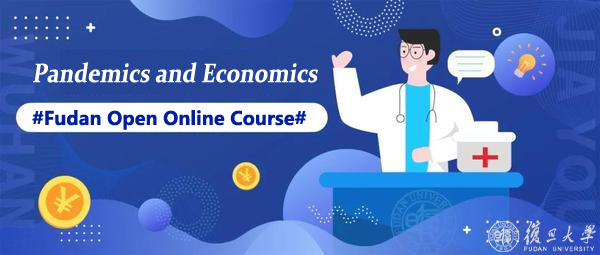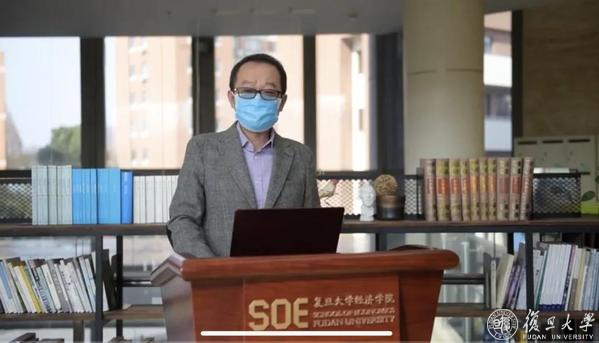
In response to people’s growing attention on the economic impact of COVID-19, the School of Economics of Fudan University launched an online course titled Pandemics and Economics on March 1, explaining how the outbreak has been affecting China’s macroeconomy, fiscal policy and public affairs. The course consists of lectures by renowned professors with related expertise. Videos of the streamed course are available from the website and WeChat of Fudan School of Economics.

The first session of the course, themed “What you need to know about the economic impact of the coronavirus?”, was given by Professor Zhang Jun, Dean of Fudan School of Economics and Director of China Center for Economic Studies.
Click the following link to watch the first session of the course: http://www.edp.rayasays.com/newsVim.php?299-eNews.html

Professor Zhang Jun
The first session has been received positively by Fudan students.
“Professor Zhang started with basic economic concepts to encourage us to approach GDP growth rationally,” said Huang Yichen, a postgraduate student majoring in taxation.
“The supply chain crisis mentioned by Professor Zhang is worth more attention of us. As the epidemic has begun to spread in other countries, it is urgent for all countries to think about how to stabilize the global supply chain,” said Fang Mengting, a PhD candidate majoring in Western economics.
Shi Shuo, a PhD candidate majoring in Western economics from France, said, “People hold different opinions on whether the Chinese economy can withstand the COVID-19. The five points put forward by Professor Zhang provide necessary tools for us to make good judgement on this issue.”
When a fast-growing economy hits a low due to an external shock like a war or a natural disaster occurs, it will rebound during post-disaster reconstruction. The more the economy is repressed amid the shock, the stronger the rebound will be. This has been demonstrated by Japan and Germany after World War II.
Public health emergencies such as COVID-19 may slow down growth. Yet China’s economy has a highly resilient system. For example, SARS that swept across the country in 2003 left the economy almost untouched in the long run.
Growth will recover faster if the disease is stopped earlier. But shutting down businesses for disease control can cause tremendous near-term damage to economy.
The government must weigh its options. Excessive disease control measures may take a huge cost for the moment, but it wins time for businesses to recover sooner.
Revenues will shrink due to the outbreak, but its impact on GDP is not as huge as many imagine.
In recent years, the nominal quarterly GDP growth rate in China has remained above 8%. As the nominal GDP of the first quarter of 2019 is 21.8 trillion RMB, without impact from the outbreak, the nominal GDP of this quarter should grow 1.75 trillion RMB, which translates to an increase of around 6 trillion RMB in business revenue and industrial output. These figures will help us understand whether China will see negative growth this quarter.
The damage caused to the supply chain is more profound than that to consumption.
Auto parts suppliers in Hubei province account for 10% of the total in China and it is estimated that Hubei’s stock can sustain for only one month. The shutdown of auto part manufacturing in Hubei can cause panics in the international market. Therefore, it is of paramount importance to China and the rest of the world that these businesses resume production.
In China, there are over 80 million small and medium-sized companies (SMEs) accounting for 95% of all businesses in China and contributing to 60% of GDP, 70% of employment and 50% of tax revenue. However, they are often most vulnerable to external shocks. The government need to do more to keep these businesses afloat.
Editor: Deng Jianguo, Li Yijie